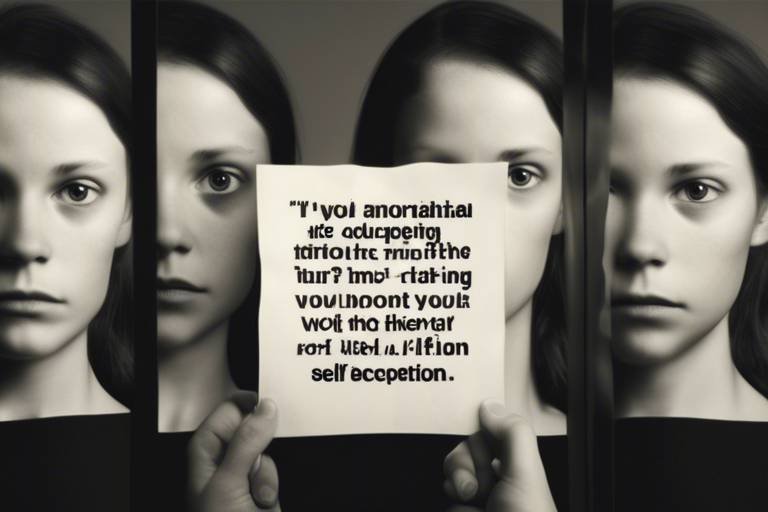Understanding the Morality of Legacies
The concept of legacy is a multifaceted one, intricately woven into the fabric of our identities and values. At its core, a legacy represents what we leave behind, not just in terms of material possessions, but also the ideals, beliefs, and lessons that shape future generations. It's like planting a tree; the seeds we sow today will grow into a forest that others will navigate tomorrow. But what does it mean to create a legacy? And how do our actions today echo through time?
In various cultures, legacies are seen as a way to honor ancestors while simultaneously guiding the living. For instance, in many Indigenous cultures, the concept of legacy is intertwined with the idea of stewardship of the land, emphasizing a responsibility to protect and nurture the environment for future generations. This perspective challenges us to think about how our choices impact not only our immediate surroundings but also the world at large.
Moreover, legacies can be both **positive** and **negative**. They can inspire greatness, instill values, and foster community, but they can also perpetuate cycles of inequality, prejudice, and conflict. Think about it: when a leader leaves behind a legacy of division, that shadow looms large over future generations, shaping their perceptions and actions. Thus, understanding the morality of legacies requires a deep dive into the ethical implications of what we choose to leave behind.
As we navigate the complexities of our own legacies, we must also consider how they influence societal values. For example, consider the legacies of historical figures like Martin Luther King Jr. or Mahatma Gandhi. Their commitment to justice and peace continues to inspire movements worldwide, demonstrating how a strong moral compass can leave a lasting impact. Conversely, the legacies of tyrants remind us of the destructive paths that can also be forged. These examples serve as poignant reminders that our legacies are not just personal; they ripple through society, shaping collective beliefs and behaviors.
In a world where information travels at lightning speed, the narratives we create around our legacies become increasingly important. They are the stories that define us, the myths that we pass down, and the lessons we impart to future generations. By examining our legacies through a moral lens, we begin to understand not just who we are, but who we aspire to be. It’s a journey of self-discovery and ethical reflection, prompting us to ask: What do we want to be remembered for? How can we ensure that our legacies contribute positively to the world?
In conclusion, the morality of legacies is a rich tapestry of definitions, historical contexts, and personal reflections. As we explore this intricate subject, we uncover the profound responsibilities that come with shaping our legacies. It's not merely about what we leave behind but also about how we influence the lives of those who will come after us. So, as you ponder your own legacy, remember that every action, no matter how small, contributes to the larger narrative of humanity.
- What is a legacy? A legacy is what we leave behind for future generations, encompassing values, beliefs, and material possessions.
- Why are legacies important? Legacies shape individual identities and societal values, influencing how future generations perceive their roles in the world.
- How can I create a positive legacy? By acting responsibly, making ethical choices, and contributing to your community, you can create a legacy that inspires others.
- What are some examples of negative legacies? Negative legacies can include those left by oppressive leaders or harmful practices that perpetuate inequality and injustice.

The Concept of Legacy
Understanding what a legacy truly means is essential, as it holds a profound significance in shaping both personal and collective identities. A legacy can be defined in various ways, depending on cultural, social, and individual perspectives. At its core, a legacy is the mark we leave on the world, a reflection of our values, beliefs, and actions. It encompasses not only the tangible assets we pass down—like wealth or property—but also the intangible influences we impart, such as traditions, ideas, and ethical principles.
In many cultures, legacies are viewed as a way to connect generations, a bridge between the past and the future. For instance, in Indigenous cultures, legacies are often tied to the land and the stories that shape community identities. These narratives are passed down through generations, teaching younger members about their heritage, responsibilities, and the moral lessons learned from ancestors. Similarly, in Western societies, the concept of legacy often revolves around the idea of inheritance, where wealth and property are transferred from one generation to the next, raising questions about fairness, entitlement, and social responsibility.
The significance of legacy extends beyond individual families; it also plays a crucial role in shaping societal values. Consider the legacies of historical figures like Martin Luther King Jr. or Nelson Mandela. Their struggles and triumphs have left an indelible mark on civil rights movements worldwide, influencing countless individuals to advocate for justice and equality. The legacies of such leaders inspire future generations to pursue change and uphold the values of compassion and courage.
Moreover, the interpretation of legacy can vary widely. Some may see it as a burden, a weight of expectations that can stifle individuality and creativity. Others may view it as a guiding light, a source of motivation to achieve greatness. This duality raises an important question: what kind of legacy do we want to create? Will it be one that empowers and uplifts, or one that confines and restricts?
As we navigate our lives, it's essential to reflect on the legacies we are building. Are we contributing positively to our communities? Are we instilling values in our children that promote kindness, integrity, and responsibility? The answers to these questions can help us understand the moral implications of our actions and decisions. In essence, our legacies are not just about what we leave behind; they are about the impact we have on others and the world at large.
In conclusion, the concept of legacy is multifaceted and deeply intertwined with morality. It challenges us to consider not just what we inherit, but what we choose to pass on. As we ponder our legacies, let us strive to create a narrative that reflects our highest values and aspirations, one that resonates through time and inspires future generations.
- What is the definition of a legacy? A legacy is the impact or influence one leaves behind, encompassing both tangible and intangible elements.
- How do legacies shape individual identities? Legacies influence personal values, beliefs, and the way individuals perceive their roles in society.
- Can legacies be both positive and negative? Yes, legacies can have both positive influences, such as inspiring change, and negative impacts, such as perpetuating harmful traditions.
- Why is understanding legacy important? Understanding legacy helps individuals reflect on their values and the impact of their actions on future generations.

Historical Perspectives on Legacies
When we think about legacies, it’s impossible to ignore the profound impact that history has on their formation and interpretation. Legacies are not merely artifacts of the past; they are the living narratives that shape our present and inform our future. From the monumental achievements of great leaders to the tragic downfalls of empires, historical legacies serve as both warnings and inspirations. They remind us of our shared humanity and the moral lessons that echo through time.
Take, for instance, the legacy of Martin Luther King Jr., whose fight for civil rights in the United States has left an indelible mark on social justice movements worldwide. His words, “Injustice anywhere is a threat to justice everywhere,” continue to resonate, urging us to reflect on our responsibilities as global citizens. This legacy has not only shaped the identity of a nation but has also influenced countless individuals to stand up against oppression. In stark contrast, we can look at the legacy of Adolf Hitler, whose actions during World War II serve as a chilling reminder of the depths of human cruelty and the consequences of unchecked power. These contrasting legacies provoke us to question: What kind of legacy do we want to leave behind?
Throughout history, legacies have been shaped by significant events, cultural shifts, and influential figures. For example, the Renaissance period brought forth a flourishing of art and science, leaving a legacy that continues to inspire creativity and innovation. In contrast, the Industrial Revolution transformed economies and societies, but also raised moral questions about labor exploitation and environmental degradation. Each of these historical moments provides a unique lens through which we can examine the ethical implications of legacies.
To further illustrate the impact of historical legacies, consider the following table that highlights key events and their lasting influences:
| Event | Legacy | Impact on Society |
|---|---|---|
| American Civil Rights Movement | Equality and Justice | Inspiration for global human rights movements |
| Fall of the Berlin Wall | Unity and Freedom | Symbol of the end of Cold War divisions |
| Women's Suffrage Movement | Empowerment and Representation | Foundation for modern gender equality movements |
As we explore these legacies, it becomes evident that they are not static; they evolve with each generation's interpretation and application. For example, the legacy of colonialism is being reexamined today as societies grapple with the implications of historical injustices and strive for reparative justice. This ongoing dialogue reflects a growing awareness of how legacies can be both a source of pride and a burden that requires acknowledgment and reckoning.
Moreover, the narratives surrounding legacies often change depending on who tells the story. Different cultures and communities may emphasize various aspects of a legacy, leading to a rich tapestry of interpretations. This diversity of perspectives highlights the importance of inclusive dialogue in understanding the moral dimensions of legacies. Are we willing to listen to the voices that have been historically marginalized? How can we ensure that our collective legacies reflect the values of equity and justice?
In conclusion, the historical perspectives on legacies invite us to reflect deeply on our past, consider our present actions, and ponder the future we wish to create. As we navigate the complexities of morality and legacy, we must ask ourselves: What lessons from history will we carry forward, and how will they shape our identity and societal values?
- What is a legacy? A legacy is something handed down from one generation to another, often encompassing values, achievements, and lessons learned.
- Why are historical legacies important? They provide context for our current societal norms and values, helping us learn from past mistakes and successes.
- How can we create a positive legacy? By engaging in actions that promote social justice, environmental responsibility, and community well-being, we can contribute to a legacy that benefits future generations.

Legacies in Literature
When we dive into the world of literature, we often find ourselves confronted with the intricate web of legacies that characters leave behind. These legacies are not just mere possessions or titles; they embody the values, beliefs, and moral dilemmas that shape the identities of both the characters and the societies they inhabit. Literature serves as a mirror reflecting the complexities of human experience, and through various narratives, we can explore how legacies influence not only the characters' lives but also the readers' understanding of morality.
Take, for instance, the classic tale of Macbeth by William Shakespeare. Macbeth's ambition leads him down a dark path, ultimately resulting in a legacy of betrayal and murder. His actions raise profound questions about the morality of ambition and the costs associated with it. The legacy he leaves behind is one of chaos and destruction, prompting readers to consider the ethical implications of unchecked ambition. Similarly, in To Kill a Mockingbird by Harper Lee, Atticus Finch's moral courage and commitment to justice create a legacy of integrity and empathy that resonates through generations. This legacy challenges readers to reflect on their own values and the impact of their actions on society.
Moreover, the role of narratives in shaping our understanding of legacies cannot be understated. Through storytelling, authors craft complex characters whose choices reverberate through time, influencing future generations. For example, in The Great Gatsby by F. Scott Fitzgerald, Jay Gatsby's pursuit of the American Dream and his tragic end serve as a cautionary tale about the hollowness of wealth and the elusive nature of happiness. His legacy is one of aspiration, yet it also serves as a stark reminder of the moral bankruptcy that can accompany the relentless pursuit of material success.
In examining the legacies left by literary figures, we can categorize them into various themes that highlight moral questions:
- Redemption: Characters like Ebenezer Scrooge in A Christmas Carol illustrate how one can alter their legacy through acts of kindness and generosity.
- Consequences of Choices: The tragic fate of characters like Anna Karenina in Anna Karenina emphasizes how personal choices can lead to societal repercussions.
- Social Justice: Works such as The Color Purple by Alice Walker challenge readers to confront issues of race, gender, and the legacies of oppression.
Ultimately, literature serves as a powerful medium through which we can explore the multifaceted nature of legacies. These narratives not only entertain but also provoke thought, encouraging readers to engage in deeper conversations about morality, responsibility, and the lasting impact of our actions. As we turn the pages of these literary works, we find ourselves grappling with the same ethical dilemmas faced by the characters, prompting us to question what kind of legacy we wish to leave behind in our own lives.
What is the significance of legacies in literature?
Legacies in literature often reflect the moral and ethical dilemmas faced by characters, allowing readers to explore complex themes and question their own values.
How do literary legacies influence contemporary society?
Literary legacies can shape societal values and norms by highlighting important issues, encouraging discussions around morality, justice, and personal responsibility.
Can legacies be changed over time?
Yes, characters in literature often undergo transformations that alter their legacies, demonstrating the potential for redemption and growth.

Famous Literary Examples
Literature serves as a powerful lens through which we can examine the intricate relationship between legacy and morality. Numerous literary works have tackled the complexities of legacies, offering readers a chance to reflect on the ethical implications of inheritance, responsibility, and the impact of one’s actions on future generations. One of the most notable examples is “A Tale of Two Cities” by Charles Dickens. In this classic novel, the legacy of the French Revolution serves as a backdrop, illustrating how the actions of past generations can ripple through time, affecting the lives of individuals in profound ways. The protagonist, Sydney Carton, ultimately sacrifices himself for the sake of another, leaving behind a legacy of redemption and selflessness that resonates deeply with readers.
Another compelling example is found in “The Great Gatsby” by F. Scott Fitzgerald. Jay Gatsby’s pursuit of wealth and status is driven by his desire to reclaim a lost love, but ultimately, his legacy is one of tragedy and disillusionment. Through Gatsby, Fitzgerald explores the moral decay that can accompany the relentless pursuit of the American Dream, prompting readers to consider what constitutes a meaningful legacy. Is it the wealth one accumulates, or the relationships and values one upholds? This question lingers long after the final page is turned.
In addition to these narratives, the works of Toni Morrison also provide rich ground for exploring legacies. In “Beloved”, the haunting legacy of slavery profoundly impacts the characters, shaping their identities and moral dilemmas. The protagonist, Sethe, is haunted by her past actions and the legacy of trauma that she passes on to her children. Morrison’s exploration of memory and the weight of historical legacies invites readers to grapple with the ethical responsibilities tied to the past.
Furthermore, the “Harry Potter” series by J.K. Rowling presents a modern take on legacy. The character of Harry inherits not only wealth but also a legacy of bravery and sacrifice from his parents. The moral lessons embedded in his journey—courage, friendship, and the fight against evil—highlight how positive legacies can inspire individuals to make ethical choices. Rowling’s work prompts us to reflect on what we leave behind for future generations, encouraging a sense of responsibility that transcends mere material inheritance.
These literary examples illustrate that legacies are not merely about what we leave behind, but also about the values we instill in others and the moral choices we make. Each story serves as a reminder that our actions today can shape the narratives of tomorrow, influencing not only our own lives but also the lives of those who follow. As we navigate our own legacies, it’s worth pondering: what stories will we tell, and how will they be remembered?

The Role of Narratives
Narratives are more than just stories; they are the threads that weave together the fabric of our understanding of legacies. Each tale we tell, whether it's a personal anecdote or a grand historical epic, shapes our perceptions of morality and ethics. Think about it: what do we pass down through generations? It’s not merely possessions or wealth, but the stories that define who we are and how we relate to one another. Narratives serve as powerful tools for exploring the complexities of legacies, enabling us to grapple with the moral implications that arise from them.
In many cultures, stories are the primary means through which values and lessons are communicated. For instance, in Indigenous cultures, oral traditions play a crucial role in preserving history and imparting wisdom. These narratives often emphasize the importance of communal responsibility and the interconnectedness of life, urging future generations to honor their ancestors while considering the impact of their actions on the world around them. This highlights how narratives can cultivate a sense of moral duty towards both personal and collective legacies.
Moreover, narratives also allow us to question and critique legacies. Consider the stories we tell about historical figures: are they celebrated heroes, or do they embody moral failings? For example, while some might view figures like Christopher Columbus as pioneers, others see him as a symbol of colonialism and oppression. This duality in narratives not only reflects societal values but also influences how we interpret legacies. The stories we choose to tell shape our understanding of right and wrong, often leading us to reevaluate our own legacies.
To illustrate this point, think about the impact of popular literature and media. Books, films, and even social media narratives have a profound effect on public perception. They can either reinforce traditional views about legacy or challenge them, prompting discussions about ethics and morality. For instance, novels like "The Great Gatsby" delve into the moral decay behind the American Dream, forcing readers to confront the darker aspects of wealth and legacy. These narratives encourage us to reflect on our values and the legacies we wish to leave behind.
Furthermore, narratives can inspire action. When we hear stories of individuals who have transformed their inherited legacies into forces for good, we are often compelled to follow suit. Philanthropic narratives, for instance, highlight how wealthy individuals have used their resources to address social issues, fostering a sense of moral responsibility among others. This is where the power of storytelling truly shines—by motivating us to think critically about our own legacies and the responsibilities that come with them.
In conclusion, narratives play a pivotal role in shaping our understanding of legacies. They serve not only as reflections of our values but also as catalysts for change, encouraging us to examine our moral responsibilities towards future generations. As we continue to tell and retell these stories, we must remain mindful of the legacies we are creating—both for ourselves and for those who will come after us.
- What is the significance of narratives in understanding legacies?
Narratives help us explore and interpret the moral implications of legacies, shaping our values and guiding future actions. - How do narratives influence societal values?
Stories reflect and challenge existing values, prompting discussions about ethics and morality related to legacies. - Can narratives inspire positive change regarding legacies?
Yes, compelling stories of transformation and responsibility can motivate individuals to act ethically and consider their own legacies.

Modern Implications of Legacy
In our fast-paced, ever-evolving world, the notion of legacy has morphed into something far more complex than it once was. Today, legacies are not just about the tangible assets we leave behind; they encompass our values, beliefs, and the impact we make on the world. As we navigate through the 21st century, the implications of our legacies touch on critical issues such as environmental responsibility, social justice, and the ethical considerations surrounding wealth transfer.
Take, for instance, the growing awareness of climate change. Many individuals and organizations are now considering their environmental legacy. Are we leaving behind a planet that future generations can thrive on? This question weighs heavily on the conscience of many, prompting a shift towards sustainable practices. People are increasingly aware that their choices today—be it in consumption, waste management, or advocacy—will ripple through time, affecting the earth and its inhabitants long after they are gone. It's a stark reminder that our legacy is not just about what we accumulate, but how we treat the world around us.
Furthermore, social justice movements have sparked a reevaluation of what it means to leave a positive legacy. Historical injustices continue to shape societal dynamics, and many are now grappling with the moral implications of their legacies in this context. For example, individuals from historically privileged backgrounds are increasingly questioning how they can contribute to rectifying systemic inequalities. The legacy of wealth, in this case, is not merely about financial inheritance but also about the responsibility to advocate for change and support marginalized communities. This shift reflects a broader understanding that a meaningful legacy encompasses not just personal success but also the betterment of society.
The conversation around wealth transfer further complicates the modern implications of legacy. As affluent individuals approach the end of their lives, they often face the dilemma of how to distribute their wealth. Should they pass it on to their heirs without conditions, or should they impose certain responsibilities? This is where the ethics of inheritance come into play. The decisions made in these moments can significantly impact family dynamics and societal structures. Wealth can be a powerful tool for good, but it can also perpetuate cycles of inequality if not handled thoughtfully.
To illustrate the modern implications of legacy, consider the following table that summarizes key areas where legacies influence contemporary ethical discussions:
| Area of Legacy | Implications |
|---|---|
| Environmental Responsibility | Impact on future generations and the health of the planet. |
| Social Justice | Addressing historical injustices and promoting equality. |
| Wealth Transfer | Ethical considerations in inheritance and its effects on societal structures. |
In conclusion, the implications of legacy in the modern world are profound and multifaceted. As we reflect on what we will leave behind, it’s crucial to recognize that our legacies are not just personal; they are intertwined with the fabric of society. The choices we make today will echo through time, shaping the lives of those who come after us. By embracing a broader understanding of legacy, we can ensure that we leave behind not just material wealth, but a world that is more just, equitable, and sustainable for future generations.
- What is a legacy? A legacy is what we leave behind for future generations, encompassing both tangible assets and intangible values.
- How can I create a positive legacy? By making conscious choices that reflect your values and contribute to the betterment of society and the environment.
- Why is legacy important? Legacies shape individual identities and societal values, influencing how future generations perceive their responsibilities.

Ethics of Inheritance
Inheritance is a topic that often stirs up deep emotions and heated discussions. At its core, it raises significant moral questions about what it means to receive wealth, property, or values from those who came before us. When we think about inheritance, we are not just considering the tangible assets that are passed down; we are also grappling with the ethical implications of how those assets are distributed and the responsibilities they entail. Is it fair for some to inherit vast fortunes while others struggle to make ends meet? This disparity can create a sense of injustice that permeates our society.
One of the most critical aspects of inheritance ethics revolves around the concept of fairness. Families often have complex dynamics, and the distribution of an estate can lead to conflicts that last for generations. For example, consider a scenario where a wealthy parent decides to leave their entire fortune to one child, while neglecting the others. This decision can not only create rifts within the family but also raises questions about the parent's moral obligation to treat their children equally. Should love and affection be reflected in financial decisions? Or should wealth be distributed based on merit and need?
Moreover, we cannot ignore the societal implications of inheritance. Wealth concentration can lead to a cycle of privilege, where those who inherit significant wealth have access to better education, healthcare, and opportunities, perpetuating inequality. In this context, the ethics of inheritance become intertwined with issues of social justice. As we look around, we see movements advocating for wealth redistribution and fairer taxation policies. These discussions often stem from the belief that inherited wealth should come with a responsibility to give back to the community.
In this digital age, where information is at our fingertips, the conversation around inheritance also includes the ethical considerations of digital assets. What happens to our online presence and the digital wealth we accumulate? Who inherits our social media accounts, online businesses, or cryptocurrencies? These questions highlight the evolving nature of inheritance and the need for clear legal frameworks to address them. As we navigate this new landscape, we must also consider the moral responsibilities tied to these digital legacies.
To illustrate the complexities of inheritance ethics, let’s take a closer look at some key factors influencing inheritance decisions:
| Factor | Description |
|---|---|
| Family Dynamics | How relationships within the family influence decisions on wealth distribution. |
| Societal Norms | Cultural expectations regarding fairness and equality in inheritance. |
| Legal Framework | The laws governing inheritance and how they reflect societal values. |
| Philanthropic Intent | The desire to leave a positive impact through charitable giving. |
Ultimately, the ethics of inheritance challenge us to reflect on our values and priorities. They prompt us to ask: what kind of legacy do we want to leave behind? Are we merely passing down wealth, or are we instilling values that encourage responsibility and community engagement? In a world where wealth can create both opportunities and disparities, the moral questions surrounding inheritance are more relevant than ever.
- What is the ethical dilemma surrounding inheritance? The ethical dilemma often revolves around fairness, equality, and the responsibilities that come with wealth.
- How can families navigate inheritance disputes? Open communication, clear wills, and sometimes mediation can help resolve conflicts.
- What role does philanthropy play in inheritance ethics? Philanthropy can be a way to address social inequalities and create a positive legacy.

Wealth and Responsibility
When we think about wealth, what often comes to mind is the image of luxury, power, and freedom. But have you ever stopped to consider the responsibility that comes with it? Wealth isn’t just about having money; it’s about the impact that money can have on individuals, communities, and even the world. In fact, the relationship between wealth and moral responsibility is a complex tapestry woven from threads of ethics, societal expectations, and personal motivations.
Imagine for a moment that you’ve inherited a substantial fortune. What would you do with it? Would you indulge in all the luxuries life has to offer, or would you feel a tugging obligation to use that money for the greater good? This dilemma is what many wealthy individuals face today. The legacy they leave behind is not just about their wealth, but also about how they choose to use it. The choices they make can either uplift communities or perpetuate inequality.
One of the most pressing questions surrounding inherited wealth is: How should affluent individuals navigate their moral obligations? Here are a few considerations:
- Community Impact: Wealth can be a powerful tool for positive change. Investing in local businesses, supporting education, and funding healthcare initiatives are just a few ways that wealthy individuals can make a difference.
- Philanthropy: Many affluent people choose to engage in philanthropy, donating a portion of their wealth to charitable causes. However, it’s crucial to consider the motivations behind these donations. Are they genuinely altruistic, or are they a way to alleviate guilt?
- Environmental Responsibility: In today’s world, wealth comes with the responsibility of caring for our planet. Wealthy individuals have the means to invest in sustainable practices and technologies that can help combat climate change.
Wealth can also create a disconnect between individuals and the challenges faced by less fortunate members of society. This disconnect often leads to a lack of understanding about the realities that many people face daily. A wealthy individual may live in a bubble, shielded from the struggles of poverty, which can hinder their ability to empathize and act responsibly. This highlights the importance of awareness and education in fostering a sense of responsibility among the wealthy.
Moreover, the concept of intergenerational wealth transfer raises additional ethical questions. Should the next generation automatically inherit vast sums of money, or should there be conditions attached to that wealth? Some argue that unearned wealth can lead to a sense of entitlement and complacency, while others believe that it provides opportunities for education and growth. This debate is crucial as it shapes the moral landscape of our society.
In conclusion, the relationship between wealth and responsibility is a crucial aspect of understanding legacies. Wealth can serve as a powerful catalyst for change, but it also comes with significant ethical implications. As we navigate this complex terrain, it’s essential for individuals to reflect on their values and the impact of their financial decisions. After all, the legacy we leave behind is not measured solely by the wealth we accumulate but by the positive changes we inspire in the world.
1. What is the primary responsibility of wealthy individuals?
The primary responsibility is to use their wealth to create positive change in society, whether through philanthropy, sustainable practices, or community investment.
2. How can inherited wealth affect future generations?
Inherited wealth can lead to a sense of entitlement or complacency, but it can also provide opportunities for education and personal growth if managed responsibly.
3. Is philanthropy always a genuine act?
Not necessarily. While many engage in philanthropy with altruistic motives, some may do so to alleviate guilt or enhance their public image.
4. How can wealthy individuals stay connected to societal issues?
By actively engaging with communities, educating themselves about social issues, and supporting initiatives that address these challenges, wealthy individuals can maintain a connection to societal realities.

Philanthropy and Legacy
Philanthropy is often viewed as a beacon of hope in the complex landscape of legacies. It’s not just about giving money; it’s about creating a lasting impact that resonates through generations. When we think of philanthropy, we might picture wealthy individuals donating vast sums to charity, but the reality is much richer and more nuanced. Philanthropy encompasses a wide range of actions aimed at improving the lives of others, and it raises important questions about the moral responsibilities tied to wealth and influence.
At its core, philanthropy is driven by the desire to make a difference. But what motivates philanthropic efforts? Is it genuine altruism, a desire for social status, or perhaps a mix of both? Many wealthy individuals engage in philanthropy as a way to give back to society, addressing issues like poverty, education, and health care. However, the motivations can vary greatly, and understanding these motivations is crucial in evaluating the moral implications of their legacy.
Consider this: when a billionaire donates millions to build a hospital or fund a scholarship program, what are they really leaving behind? Are they creating a legacy of goodwill, or are they simply attempting to assuage their own guilt? This question is at the heart of the debate surrounding philanthropy and legacy. Philanthropy can serve as a powerful tool for societal change, but it can also perpetuate existing inequalities if not approached thoughtfully.
One of the most significant aspects of philanthropy is its potential to shape societal values. When a person or organization commits to a cause, they can inspire others to follow suit, creating a ripple effect of positive change. For instance, the Bill and Melinda Gates Foundation has made significant strides in global health and education, influencing countless individuals and organizations to invest in similar initiatives. This illustrates how philanthropic legacies can inspire collective action and drive societal progress.
However, the ethical considerations surrounding philanthropy cannot be ignored. Wealthy individuals often have the power to dictate which causes receive attention and funding, which can lead to a skewed understanding of societal needs. This raises questions about accountability and the moral obligation of philanthropists to engage with the communities they aim to help. Are they truly listening to the needs of these communities, or are they imposing their own vision of what is important?
To better understand the complexities of philanthropy and legacy, consider the following table that outlines some key aspects:
| Aspect | Positive Impact | Potential Pitfalls |
|---|---|---|
| Community Engagement | Empowers local voices | Can overlook grassroots needs |
| Resource Allocation | Addresses critical issues | May prioritize popular causes over urgent needs |
| Long-term Commitment | Creates sustainable change | Can lead to dependency on philanthropy |
Ultimately, the relationship between philanthropy and legacy is a complex dance of intention and impact. It invites us to reflect on our own values and the legacies we wish to create. Are we contributing to a world that prioritizes equity and justice, or are we perpetuating systems of inequality? As we navigate this landscape, it’s essential to engage in open dialogues about the role of philanthropy in shaping our collective future.
In conclusion, philanthropy holds immense potential to create a positive legacy, but it requires a thoughtful approach that prioritizes genuine engagement and accountability. By understanding the motivations behind philanthropic efforts and their implications for society, we can better appreciate the moral responsibilities tied to wealth and influence. After all, a legacy is not just what we leave behind; it’s also about the values and principles we instill in future generations.
- What is the primary purpose of philanthropy? The primary purpose of philanthropy is to improve the quality of life for individuals and communities through charitable actions and contributions.
- How can philanthropy influence societal values? Philanthropy can influence societal values by encouraging collective action towards important causes and inspiring others to contribute to social change.
- What are some ethical considerations in philanthropy? Ethical considerations include accountability to communities, the potential for reinforcing existing inequalities, and the motivations behind charitable giving.
- How can individuals engage in philanthropy? Individuals can engage in philanthropy by donating time, money, or resources to causes they care about, and by advocating for social justice and community needs.
Frequently Asked Questions
- What is the significance of a legacy?
A legacy represents the values, beliefs, and contributions we leave behind for future generations. It shapes not only our personal identities but also influences societal norms and collective memories. Think of it as a roadmap that guides others in understanding who we were and what we stood for.
- How do historical events shape legacies?
Historical events play a crucial role in defining legacies. They provide context and meaning to the actions of individuals and societies. For instance, the legacies of influential figures like Martin Luther King Jr. or Mahatma Gandhi continue to inspire movements for justice and equality today, showing how past actions resonate through time.
- What role does literature play in understanding legacies?
Literature serves as a mirror reflecting our moral dilemmas and societal values connected to legacies. Through stories and characters, readers can explore complex themes of responsibility, sacrifice, and the consequences of one's actions. It's like peering into a world that helps us navigate our own moral compass.
- What are the modern implications of legacy?
In today's context, legacies are intertwined with pressing issues like environmental sustainability and social justice. The way we handle our legacies today can significantly impact future generations, making it essential to consider our actions and their long-term effects on the world.
- What ethical questions arise from inheritance?
Inheritance often brings up moral questions regarding wealth distribution and family dynamics. It raises issues about fairness, privilege, and the responsibilities that come with inherited wealth. Essentially, it challenges us to think about how we can use our resources to contribute positively to society.
- How does philanthropy relate to legacy?
Philanthropy is frequently viewed as a way to create a meaningful legacy. It reflects the motivations of individuals to give back to society and address social issues. By engaging in charitable activities, individuals can influence their legacies positively, impacting the lives of others and fostering a culture of giving.



















